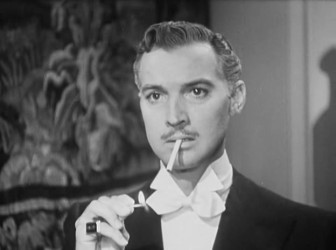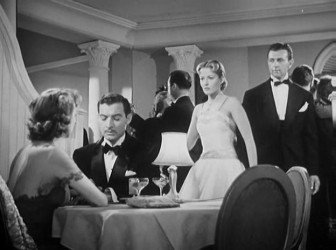Note: Since Ruthless Reviews was founded “in 2003 or maybe 2004”, I figured New Years 2014 was as good a time as any to celebrate its 10th anniversary.
Have you ever wondered how to be a bigger asshole than you already are? Does the fact that there are people in this world who not only do not know your name, but also don’t think that you are the absolute worst person in the world bother you? Are you restless because it’s been some time since a fiancé shed tears after your heartless breaking off of the engagement? Never fear, for the one and only H. Woodruff Vendig is here to give your life meaning all over again. For through our journey with him, we learn yet another inalienable truth about our world: Man, America really has always been this fucked up.
This is a film from 1948, yet it might as well have been made yesterday. I only watched it due to its title, as the thought of reviewing a film called Ruthless on Ruthless Reviews gave me Xzibitface, but it is actually a fairly entertaining take on the Wall Street kleptocracy. According to the opening credits, it is adapted from a novel that I’ve never read. Perhaps the novel fleshes out the characters more; as it stands, the film seems to gloss over some of the details of Vendig’s transition from innocent youth to complete asshole. Still, it’s nice to expand my knowledge of the films of the 1940’s beyond Notorious, Double Indemnity, and anything starring Rita Hayworth. Who knows, maybe one day I will watch enough movies to actually know what I’m talking about!
Ruthless opens at a gala thrown by Vendig, which he has invited all of his old friends and associates to. Vendig is selling his mansion and donating the money to the cause of world peace. Our main character is Vic, Vendig’s oldest friend and former business partner. Vic attends the party with a girl named Mallory, who bears a striking resemblance to Vendig’s first fiancé Martha. This may or may not have something to do with the fact that both characters are played by Diana Lynn, but I’m not sure. Anyway, from there, the film goes into a series of flashbacks telling the story of Vendig’s life.
The lone good thing Vendig ever did was saving Martha from drowning in a lake when they were children. Granted, Martha only fell into the lake due to Vendig and Vic having some minor fight in the boat, but Vendig still rose to the occasion. In the aftermath, Vendig runs away from his home, leaving his overbearing mother and absentee father behind as he moves in with Martha’s family. Martha’s family promises to care for him and give him everything he needs to repay him for saving their daughter.
That should have been enough for Vendig, and most people could have lived happily by eventually marrying Martha and settling into a nice job after making use of the college education provided by her family. But Vendig is not most people. Vendig is a dickbag. Sure, he’s a dickbag by the standards of 1948, and thus is less coarse and profane than the dickbags of today, but he’s a dickbag all the same. He always wants more. He wants it all. As L.A. Guns once said, “It’s never enough.”
Now, I know what you’re going to say: Aren’t most people dickbags? It’s true, but not on the level of Vendig in this film. It takes a certain type of person to screw over everyone who has ever helped you. This is the dark side of the captains of finance and industry: they are idolized by America as the ideal man, yet they themselves regard the country and its citizens with indifference at best and contempt at worst. Yet America keeps coming back for more, time and time again. Then and now, we all desire to become Vendig, even if we do not desire to make all the unpleasant decisions he made on his rise to the top. We want it all, right now, and we want be spared all the ugly details of reality.
In our current age of instant gratification, the disconnect between our dream and reality has never been more pronounced. Everyone in popular fiction is magically an expert at a young age, and never had to put in the years of hard work needed to gain true wisdom. Just look at the new Star Trek films, where the crew is more competent than the original cast despite being several decades younger than the original cast was in their movies. We want victory without sacrifice. We want success right now without numerous failures along the way. We are a nation that only a decade ago seemed to blindly believe that victory in Iraq was possible in just six months. Rumsfeld said it, and America believed. If you were one of the few, like me, who laughed at all of that a decade ago, you may remember the looks many people would give you in response to your dissent. While I didn’t realize it at the time, I know now that my dissent actually was un-American. Not in the sense that such dissent went against the principles upon which the nation was founded, but in the sense that such dissent went against America’s current delusional worldview. To state that nothing is ever that easy is an uncomfortable truth to a nation that believes it is more powerful than God.
So it is interesting to watch a film from 1948, made in that post-World War II malaise, that openly accepts the fact that profound success is often built off the ruined lives and broken relationships that such narrowly-focused ambition leaves in its wake. Vendig owns the world in the end, but he is left hated and alone. Sure, he doesn’t really seem to care about any of that, and the condemnation leveled at him by Vic never seems to have much of an effect, but at least the film presents the fact that Vendig succeeds due to his unrepentant dickishness in no uncertain terms. Obviously, it doesn’t posit that this is the only path to success, and Vic’s presence as the moral center of the film provides an argument that one can be successful without destroying people’s lives, but in Vendig we find an honest admission that screwing people over can be, if nothing else, an effective strategy to attaining money and power. It stands in stark contrast to the narrative one finds on modern cable news, where every millionaire is a demigod, made so solely from their own honest hard work, and not to be criticized under any circumstances.
But I know what some people are going to say: What do I know about money and power? I’m poor, and I am the antithesis of “ruthless”. I’m not sure what we call that nowadays, but I believe the term is “bitch made”. So, yes, I’m poor, “bitch made”, and while I’m 5 feet, 6 inches, and 135 pounds of pure sextasy, I don’t exactly light women’s loins ablaze. That’s ok, though. I listen to Tupac, one of the greatest Americans who ever lived, so I understand the worldview, if only in the abstract. In other words, I get it, even if I don’t. True story.
Anyway, Vendig is a total dick in this movie. He steals Martha away from Vic, in a clear violation of the “bros before hos” ethos. He convinces Martha’s father to pay from him to go to Harvard, then bails on Harvard after two years once he gets a good job lined up. In the process, he dumps Martha for Susan, a girl who is the daughter of the Wall Street in-crowd in New York. He schemes to take over the business interests of a gentleman named Mansfield, who is a total piece of shit himself. I know it’s 1948 in the South, but having a full stock of black housekeepers is just ridiculous. Anyway, Vendig is initially defeated by Mansfield, so he begins an affair with Mansfield’s wife to get inside information. Yes, the information about Mansfield’s businesses is printed on the inside of his wife’s vagina. Who knew?
Susan eventually happens upon Vendig with Mansfield’s wife Christa, thus ending engagement number two. Vendig, ever the consummate ladies’ man, remains undeterred. After toppling Mansfield once and for all, he marries Christa in a true “landing your command center on the ruins of their old base” move. Of course, after several years, Christa wants a divorce once she realizes that Vendig is a bigger asshole than Mansfield ever was. Vendig lets her go without much of a fight. Who cares, really? The mineral field’s been fully mined at that point anyway.
Vendig also has some other great moments, such as when he bullshits Vic into putting up $300,000 into his nefarious anti-Mansfield venture, as well as his treatment of a man named McDonald. McDonald stood by Vendig for years, and helped him with the Mansfield venture, yet when McDonald needed to be loaned five million to keep his bank above water and save his small depositor’s savings, Vendig makes him sit in the waiting room for four days. Vic is aghast when he learns of it, but their argument is cut short by the sound of a gunshot. McDonald shot himself in the waiting room. As Vendig puts it afterward, “I saved this company five million hard-earned dollars.” Shouldn’t he deduct the cleaning costs from that figure?
So it all comes crashing down at the end, when Vendig’s final farewell to Vic and Mallory before he sails off into the night is interrupted by a drunken Mansfield bent on revenge. In the struggle, both fall into the water, and are last seen attempting to strangle each other as they sink beneath the waves. Vic, shooken up in the aftermath, is consoled by Mallory, who states that, “He wasn’t a man. He was a way of life.” More than that, though, Vendig was our way of life. We can try to stand apart from Vendig, like Vic and Mallory, but at the end of the day we live within Vendig’s world, however indirectly. All of our attempts to remain above it all, and cast down judgments upon men like Vendig, remain stripped of their power as long as those judgments are cast in a world controlled by men like him. All we can do is stand powerless on the dock of his mansion, futilely trying to do nothing but understand.
I still haven’t got off my ass and watched The Wolf of Wall Street, though I plan to do so this weekend. But I suspect that Ruthless may be a nice companion piece to that film. Sure, from what I can gather, it was a B-movie in the 1940’s, and it’s not exactly regarded as a timeless classic from what I can tell. Still, it gives a nice portrait of both Wall Street malfeasance and America’s attitudes towards such matters in 1948. The poster includes the hilarious tagline “Money… Power.. Were His Gods!” It’s hard to imagine any movie today running with a tagline like that. I think we, as a nation, have accepted the fact that money and power are our gods. I don’t mean that every last person in this country worships at their altar, but that we have accepted that these things are a driving force in all of our lives, whether we covet them or not.
Or maybe I’m just crazy and don’t know what I’m talking about. I do honestly think that Bad Boys II is one of the greatest films ever made, after all…


